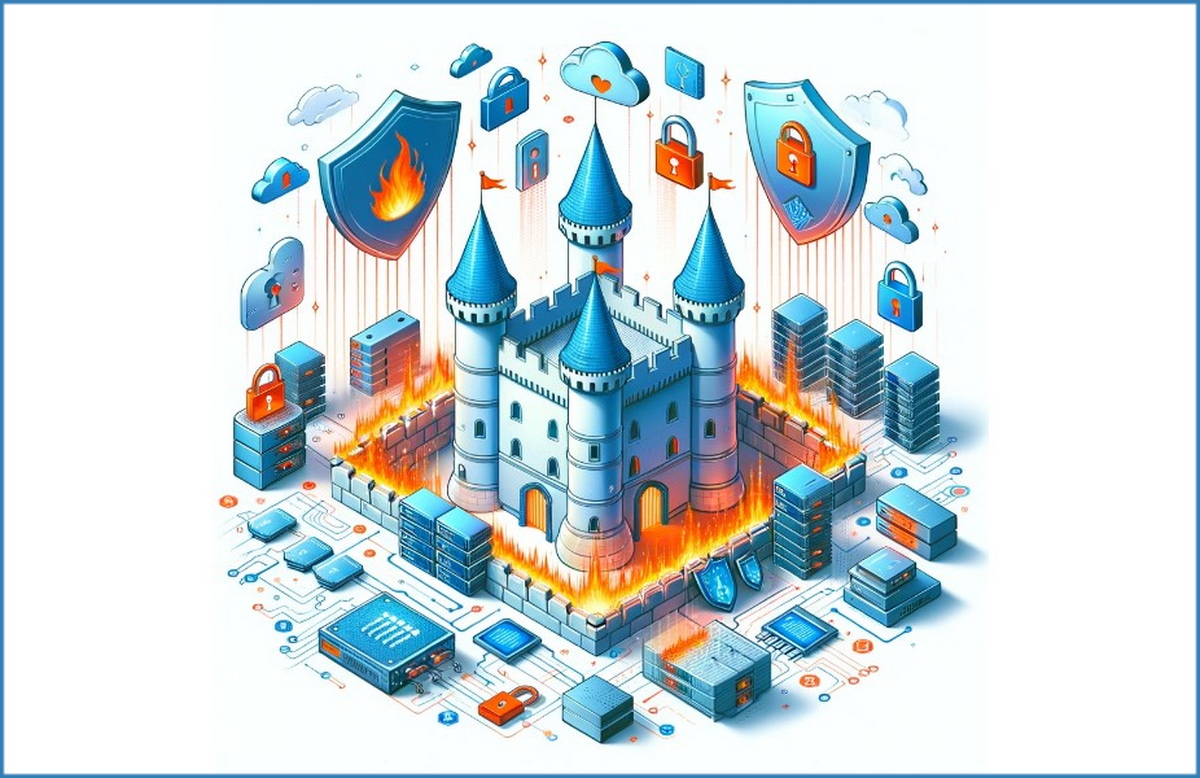
In today’s digital landscape, the importance of security in web hosting cannot be overstated. As more businesses and individuals establish online presence, protecting websites against cyber threats has become increasingly paramount.
Websites, from small blogs to large e-commerce platforms, are vulnerable to malicious attacks that can compromise sensitive data, damage reputation, and disrupt operations.
In this introduction, we’ll delve into security’s critical role in web hosting.
We’ll explore why safeguarding websites against cyber threats is essential in today’s interconnected world, and we’ll highlight the growing importance of implementing robust security measures to mitigate risks in the online environment for users.
So, buckle up as we journey to understand why security is not just an option but a necessity in web hosting.
Table of Contents
Risks of Inadequate Security: Protecting Your Digital Assets

Source: stock.adobe.com
When it comes to web hosting, inadequate security poses a significant risk to both businesses and individuals alike. Let’s have a closer look at the potential dangers lurking in the digital realm:
- Malware: Malicious software, or malware, can infect websites and wreak havoc on the site and its visitors. From stealing sensitive information to causing system crashes, malware can compromise the integrity of your website and tarnish your reputation.
- Hacking: Cybercriminals are constantly on the prowl, seeking vulnerabilities to exploit. Through hacking techniques like SQL injection and cross-site scripting, attackers can gain unauthorized access to your website, steal valuable data, and even deface your web pages.
- Data Breaches: Protecting sensitive information is paramount in today’s data-driven world. A data breach can result in the unauthorized access, disclosure, or theft of personal and financial data, leading to severe repercussions for businesses and individuals.
- DDoS Attacks: Distributed Denial of Service (DDoS) attacks can overwhelm your website with an influx of traffic, causing it to become slow or unresponsive. These attacks can disrupt operations, drive away customers, and result in significant financial losses.
The consequences of security breaches extend far beyond the digital realm. They can tarnish your reputation, erode customer trust, and lead to substantial financial and legal repercussions. From loss of revenue and downtime to regulatory fines and lawsuits, the fallout from inadequate security measures can be devastating.
Choosing a Secure Hosting Provider
Regarding web hosting, selecting the right provider with robust security measures is crucial to safeguarding your online presence. Here are some essential tips to help you make an informed decision:
- Reputation: Research the reputation of hosting providers before making a decision. Look for reviews, testimonials, and recommendations from trusted sources to gauge their reliability and track record in delivering secure hosting services.
- Uptime Guarantees: Ensure the hosting provider offers reliable uptime guarantees, minimizing the risk of downtime due to security incidents or infrastructure issues. Look for providers that provide high uptime percentages and proactive monitoring to detect and address potential problems promptly.
- Customer Support: Evaluate the quality of customer support the hosting provider offers. Opt for providers that offer responsive and knowledgeable support teams that are available 24/7 to assist you with any security-related concerns or issues that may arise.
By considering these factors, you can choose a hosting provider that prioritizes security and provides the necessary safeguards to protect your website from cyber threats. Remember, investing in a secure hosting provider is an investment in your online venture’s long-term security and success.
Implementing Additional Security Measures

Source: successware.com
While a secure hosting provider forms the bedrock of your digital defenses, fortifying your online stronghold requires a multifaceted approach. Here’s how to power-up your security arsenal beyond the offerings of your hosting provider:
- Strong Passwords: Strengthen your digital ramparts with robust passwords that serve as the first defense against unauthorized access. Opt for complex combinations of alphanumeric characters, symbols, and upper and lower-case letters. Avoid using easily guessable phrases or personal information, and consider implementing multi-factor authentication for an added layer of security.
- Regular Backups: Safeguard your digital assets with regular backups that shield you from the fallout of unexpected security breaches or data loss incidents. Implement automated backup solutions to ensure critical data is routinely archived and accessible during emergencies—store backups in secure off-site locations to mitigate the risk of loss due to physical or cyber threats.
- Software Updates: Protect your digital fortress against emerging vulnerabilities by promptly applying software updates and patches. Regularly update your content management system (CMS), plugins, themes, and other software components to plug security loopholes and guard against exploitation by cyber adversaries. Automate update processes where possible to ensure timely implementation without sacrificing efficiency.
By incorporating these additional security measures into your defense strategy, you can fortify your digital citadel against many cyber threats.
Remember, the strength of your defenses lies not just in the walls you build but in the vigilance with which you safeguard them. Stay proactive, stay vigilant, and remain secure.
Importance of Regular Monitoring and Maintenance
In the ever-evolving landscape of cybersecurity, the battle against digital adversaries is relentless. Regular monitoring and maintenance are essential to fortify your digital bastion and repel potential threats. Here’s why:
- Proactive Vigilance: Ongoing monitoring allows you to watch over your cyber stronghold, detecting and preventing from potential threats before they can breach your defenses. You can nip them in the bud by proactively identifying security vulnerabilities before they escalate into full-blown breaches.
- Timely Response: Well-timed identification of security vulnerabilities enables swift action, minimizing the window of opportunity for cyber adversaries to exploit weaknesses in your defenses. Timely response measures, such as patching software vulnerabilities and implementing security updates, can help mitigate the risk of data breaches and other security incidents.
- Continuous Improvement: Regular monitoring and maintenance facilitate continuous improvement, allowing you to fine-tune your security posture based on real-time insights and emerging threats. By staying abreast of evolving cybersecurity trends and adopting best practices, you can effectively adapt your defenses to combat emerging threats.
To strengthen your monitoring efforts, consider leveraging a range of tools and practices designed to enhance website security:
- Security Plugins: Utilize robust security plugins tailored to your content management system (CMS) to boost your website’s defenses. These plugins can provide real-time threat detection, malware scanning, and firewall protection, helping safeguard your digital assets against many cyber threats.
- Vulnerability Scanners: Deploy vulnerability scanners to conduct regular scans of your website infrastructure, identifying potential weaknesses that malicious actors could exploit. These scanners can assess the security posture of your website, pinpointing vulnerabilities in web applications, server configurations, and network infrastructure.
By embracing a proactive approach to monitoring and maintenance, fortified by using effective tools and practices, you can enhance the resilience of your digital bastion and ensure the continued security of your online assets. Remember, in the realm of cybersecurity, vigilance is the cornerstone of defense.
Educating Website Owner

Source: cybersecurityventures.com
In the ever-expanding digital landscape, safeguarding online assets extends beyond cybersecurity professionals to include website owners. Here’s why educating website owners about security best practices is crucial:
- Empowering Guardians: By advocating for the importance of cybersecurity education, website owners can become designated guardians of their virtual stronghold. With knowledge about common threats and preventive measures, they can take proactive steps to fortify their online assets and protect against cyber attacks.
- Mitigating Risks: Educating website owners about security best practices helps reduce the risks associated with cyber threats. By raising awareness about potential vulnerabilities and providing guidance on risk mitigation strategies.
- Building Resilience: A well-informed website owner is better equipped to respond effectively to evolving security threats. By staying informed about emerging trends and adopting preventive measures, they can build resilience against cyber attacks and minimize the impact of security incidents on their digital assets.
To support website owners in their quest for cybersecurity knowledge, we provide the following resources and recommendations:
- Security Blogs and Websites: Encourage owners to follow reputable security blogs and websites for up-to-date information about evolving threats and preventive measures. Websites such as OWASP, Krebs on Security, and The Hacker News offer valuable insights and analysis on cybersecurity trends.
- Online Courses and Training: Recommend online courses and training programs that cover cybersecurity fundamentals and best practices. Platforms like Coursera, Udemy, and Cybrary offer courses tailored to different skill levels and areas of interest.
- Community Forums and Discussion Groups: Encourage website owners to participate in community forums and discussion groups where they can share knowledge, ask questions, and learn from the experiences of others. Platforms like Reddit, Stack Overflow, and security-focused forums provide valuable opportunities for networking and knowledge exchange.
By fostering a culture of cybersecurity education among website owners, we can collectively strengthen our defenses against cyber threats and create a safer online ecosystem for everyone. Remember, knowledge is the most powerful weapon in the fight against cybercrime.
Empowering Website Owners

Source: driven.ca
In an increasingly interconnected digital world, the responsibility of safeguarding online assets extends beyond cybersecurity experts to include website owners themselves. By advocating for the importance of security best practices, we strive to empower website owners with the knowledge and tools necessary to protect their digital domains.
Educating website owners about security risks and preventive measures is not merely a recommendation—it’s a vital necessity in today’s cyber landscape.
By raising awareness about common threats such as malware, hacking, and data breaches, we help website owners understand their potential risks and the importance of implementing robust security measures.
Furthermore, providing resources and recommendations for staying informed about evolving security threats ensures website owners have the latest insights and strategies to mitigate risks effectively.
Whether through reputable security blogs, online courses, or community forums, the goal is to empower website owners to stay proactive and vigilant in safeguarding their online presence.
By fostering a culture of security awareness among website owners, we not only enhance the overall resilience of the digital ecosystem but also empower individuals to take control of their cybersecurity destiny. Let’s elevate security awareness and ensure a safer and more secure online environment.







